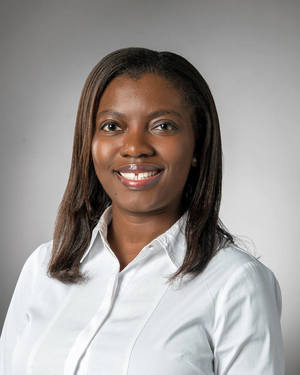
Marian Botchway is one of the program directors for the Eck Institute for Global Health (EIGH). She discusses her current research, her position with the EIGH, and her path to a career in global health. She has a BS in Biology from Washington and Lee University, an MPH from Emory University, and a PhD in Health Promotion, Education, and Behavior from the University of South Carolina.
1. Tell us a little about your personal background, academic history, and research.
I am from Ghana, and I moved to the United States to pursue further education after completing high school in my home country. In college, I learned about public health through one of my professors and decided to study it in graduate school. Over the past decade, I have worked in the public health space both in the United States and internationally. At the moment, my research primarily focuses on chronic diseases and nutrition as well as the roles that social networks and health communications can play in improving health outcomes.
2. What is your role within the Eck Institute for Global Health?
I am a Program Director with a focus on training. In this role, I facilitate the provision of training and learning opportunities for undergraduate, master's, and doctoral students. For example, I organize the Global Health Case Competition, which is open to all Notre Dame students, and I manage the Eck Institute of Global Health Fellowship that enables doctoral students to perform global health research.
3. What motivated you to pursue a career in global health?
In college, I took science-based courses and was interested in health and well-being. Additionally, some of my experiences in Ghana sparked the desire to learn more about health-related careers. However, I did not think about a career in global health until I was in graduate school and had the opportunity to work with a team that provided management training and capacity-building support for health professionals in low- and middle-income countries. That opportunity expanded my professional network and motivated me to work in global health.
4. What are you currently working on?
I have several tasks at the moment, but I will briefly describe three of them. First, I worked with students to host this year’s Global Health Case Competition. Participants provided impressive solutions to the issue of lead poisoning in India. The winning team will participate in the international competition at Emory University in a few weeks. Second, I am collaborating with colleagues to expand global health training opportunities for Notre Dame students. Third, I am working with another Notre Dame colleague to examine child hunger, behavioral and academic outcomes in the South Bend area.
Is there any research you hope to accomplish during your time at Notre Dame?
I hope to continue building my research portfolio by further examining nutrition, chronic disease prevention and management in various US populations and also in sub-Saharan Africa. Some of my work on type 2 diabetes in Ghana was recently published in two articles that can be found here and here. Additionally, I recently submitted an NIH grant application, and I am hopeful that if it gets funded, I can expand my research focus and work in the mobile health (mHealth) technology space.
Originally published by at globalhealth.nd.edu on March 02, 2021.